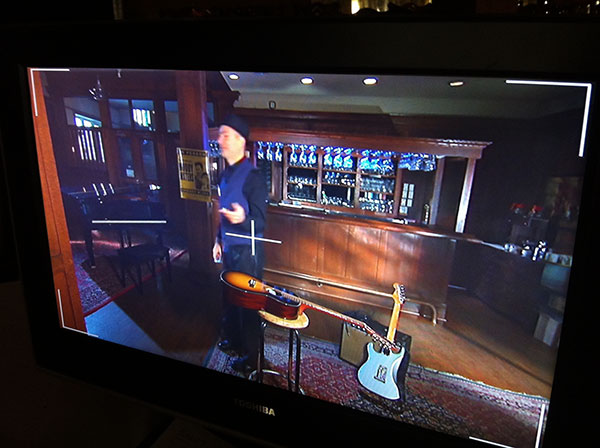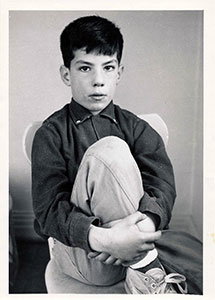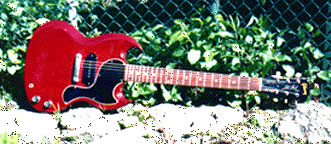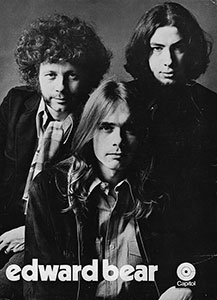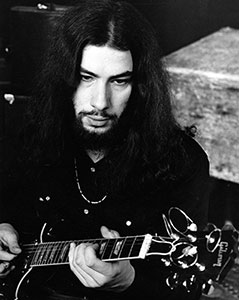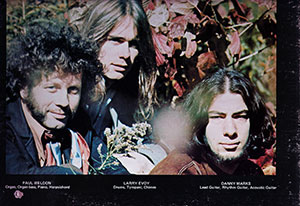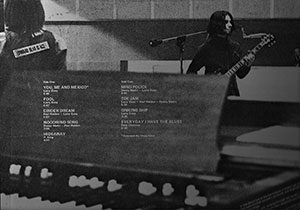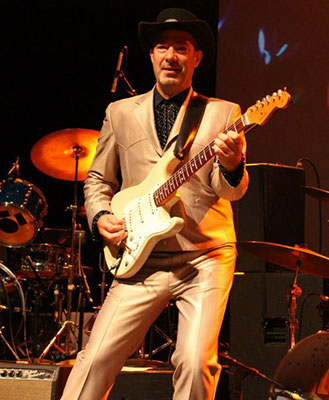

on Camera for the TV series "Cities in Blue"
|
Danny Marks Bio, In His Own Write
Blues has always been good to me, showing a way forward to twin passions of guitar and media.
Apart from Louis Armstrong, my first real blues was Jimmy Reed. I took up guitar at age eleven and played radio thanks to a Seabreeze and a stack of 45's. School never agreed with me, but music and culture surely did. By 1966, I was in Yorkville with my first serious band Edward Bear. We made it big with a mix of Pop and Blues.
I woke up one morning to an article in the Globe & Mail, claiming I was one of Canada's "finest lead guitarists". I was just nineteen. My folks must have flipped. I may have been guilty of believing the hype but Edward Bear on Capitol Records was a big deal. We played from New York to L.A. opening for Paul Butterfield, Led Zeppelin, Badfinger, Humble Pie and others. It was a wild ride. I left in 1972, over stylistic direction of the Bear.
In the 70's I joined a few bands, like Jericho, Langford and Point Blank then became a hired gun for Super Freak Rick James, Ken Tobias, Bill Amesbury, Malcolm Tomlinson and backed diverse folks like Bo Diddley, Tiny Tim, Rita Coolidge, Ronnie Hawkins, Edward Berry, Hank Ballard, The Drifters, Mr. Dressup even Johnny Bower! I Played on and voiced jingles for Coke, Bell Canada, The CNE and others. I glommed on to movie roles including cameos with Omar Sharrif and Jim Carey. I once played the part of Leonard Cohen in the movie "Heaven Before I Die". Through the 1980's we held house gigs in clubs all over Toronto and spawned a nationwide cable TV series based on our weekly jam sessions at Albert's Hall, Stormy Monday.
From 1987 - 1997, I got picked up by CBC radio, including to co-host the Hum Line with Arthur Black & Shelagh Rogers. This lead to me landing at JAZZ FM.91 and the inception of BLUZ FM, their Saturday Night program, in '97. In 2006 I received the "Blues with a Feeling" lifetime achievement award at the MBA's. I signed on to host and create music for "Cities in Blue" on HiFi TV in 2013. My composition about Lonnie Johnson from "A Friend in The Blues" got me noticed by the network. More recently we've played our blues at Massey and Keorner Hall, in concerts and festivals as well as on CBC TV and CP 24 to testify to the longevity of the blues and BB King's legacy.
Back when CD's were selling, we cut Guitarchaeology in 1996, which garnered international acclaim, Big Town Boy in 2004, A Friend in the Blues in 2007 and Cities in Blue in 2013, picking up awards in Europe and Canada with reviews from Billboard, The Toronto Star, Globe & Mail, Exclaim, NOW, Vintage Guitar and more.
In 2006, Danny was given the "Blues with a Feeling Award" for lifetime achievement in music and broadcast.
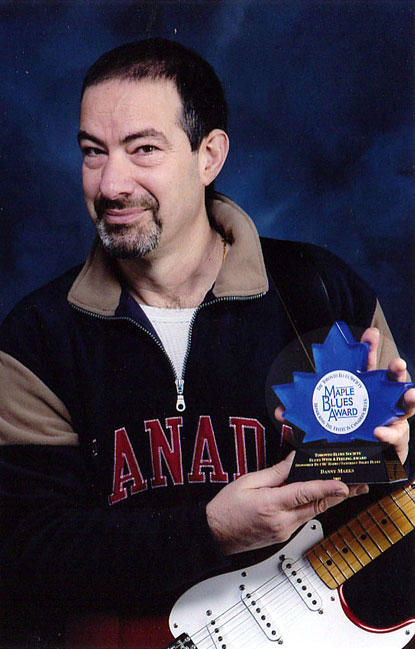 |
This iconic rocker's roots go back to the sixties as a founding member of Capitol Records' group, Edward Bear. After a span as a journey man session musician throughout the seventies, Danny settled in to the club scene, establishing a cult following as a genre bender in music and humor.
A house band gig at Toronto's famed Albert's Hall led him to host his own nation-wide TV show, Stormy Monday. Through the eighties, Danny starred in CBC radio's hit series the Hum Line.
Most recently, Danny Marks recorded two original music albums, Guitarchaeology and True, before paying tribute to Toronto's R&B roots with Big Town Boy in 2005.
Danny's in his thirteenth year as the radio host of JAZZ.FM91's Saturday night blues show, bluz.fm.
As a child, young Danny would lock himself in his room with a stack of 45's, an old Seabreeze record player, and a fantasy of having his own radio show. More than a few years later this pre-pubescent propensity paid off.
Click for larger image |
"As far back as I can remember, I've wanted to play guitar. Since we didn't have one, I just plunked on my Grandad's old violin - until my parents bought me a ukulele."
This wasn't just any uke, it was a Mousegeetar. Franchised by Walt Disney, the instrument was supposedly capable of only one song via a windup handle. The tune was "Hickory Dickory Dock".
Young Danny discovered another hidden song within his instrument's limited capacity simply by winding it backwards: something like "Dockery Dickery Hick!"
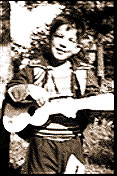 |
By age 10 or so, Danny's resourcefulness was rewarded with the parental purchase of a real plastic uke, which he proceeded, unwillingly, to drop on the playground during a noon-time recital. My dog has fleas!
Many broken ukes later, Danny got his first real guitar, by age 11 with the warning: "You're going to learn real music on this, not that rock and roll." Famous last words.
Danny was trotted off, classical guitar in hand, to Tony Bradan, father of modern guitar in Canada, and Toronto's foremost teacher for lessons in the proper way to play. Tony did not want to teach our boy how to play "Secret Agent Man". Fortunately for us, Danny quickly taught himself the songs of the day, many of which he plays to this day. Guitarchaeology was dedicated in part to Tony.
Now, segue, to the radio aspirations. By this time, Danny was enrolled in the New Play Society, studying drama under matron Dora Mavor Moore (they named the Dora awards after her). Danny was developing two talents in tandem: Music and Drama. These abilities he could take to the bank when CBC called in the mid 80's.
Okay now, back to the music. By age 11 or so, Danny was ready to join his first band. "The guys wanted me in the group because I could play. Even 'tho I didn't have my own electric, somebody came up with one for me to use. I had to play rhythm because our other guitarist didn't know any chords. It was pretty primitive to say the least, soon we were playing tea dances and church basements. The band was called "The Vandals" which we soon changed to "The New Generation". Hey, it was the 60's".
"The one thing I wanted for my thirteenth birthday was an electric guitar and I was bound and determined to get one. At the very least, I wouldn't be so dependant on the "loaner", besides, it was a crappy Regent with bad action and lousy tone. I wanted a Gibson or Fender like the big boys played."
Suffice to say, our man did get his first electric, and it was a Gibson. A 1963 S.G. Junior to be exact, cherry red it was. |
In his teens, Danny started to go further afield, or at least downtown to Yorkville where the 60's were swingin'. Yorkville was Toronto's Haight - Ashbury and home of the new music that was springing up. Bands in every coffee house, coffee-houses on every corner, (and even a few in the middle of the block).
An answer to an ad on the bulletin board at the original Long & McQuade, 803 Yonge St., an audition, and boom, Danny was in his first professional band: The Whiskey Sours. These guys didn't even live at home, they stayed up late, shaved, drank tea! The group rehearsed in Toronto's fabled Chez Monique many long days but to no avail, by early '66 the 'Sours split and Danny was a man without a band.
It was an ad in Toronto’s youth oriented After Four section of the Daily Telegram that brought Danny closer to fame and the top of the charts. The ad read "Blues Guitarist Wanted", and at age 16 Danny was a Blues Man. He called, and an audition was set up.
"I remember the scene well" says Danny, " The audition took place in the basement of an architect’s office close to the Village. Larry Evoy, the singer, absentmindedly playing with a Roger Ramjet squirt gun, Paul Weldon smiling from up from behind his Hohner organ, Craig Hemming, the bassist, wearing his trademark corduroy cape, and drummer Dave Brown practicing rolls on his bass drum using only one foot. They all looked a bit bored, and I could tell things weren't going that well in their search for the ultimate guitarist. By that time, I had my first Les Paul, a TV Special, and was feeling confident enough that I told them to "send the other guys home." We ran through Born in Chicago, Little Red Book, Good Morning Little Schoolgirl and a few others. Everyone agreed, I was in. Now all we needed was a name."
That first meeting would indeed lead to a place at the top of the charts in Canada and the USA, but not until may miles were traveled, and many years had passed.
Perhaps, gentle reader, you have guessed that this was the band that was about to become Edward Bear, named after a.a. milne’s lovable Winnie the Pooh.
Danny Marks in the 60s with Edward Bear
The complete story of The Bear has been told many times, and we won’t go into it in detail here, suffice to say, by the time they were signed by Capitol Records A&R boss Paul White, there were three Bears left, and the boys became a favorite band in Canada topping the charts with hit singles like "You Me and Mexico" and breaking sales records with their best -selling debut album "Bearings".
Click for larger image |
Click for larger image |
Click for larger image |
Click for larger image |
"We somehow bridged the gap between blues and pop, getting the hit singles but really stretching out in concert."
Indeed, Danny’s cover versions of "Hideaway" and "Everyday I Get the Blues" from Bearings were de riguer for young Canadian guitarists.
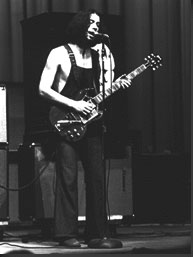 |
By 1972, however, the disparate elements in the group were coming apart, and it was time for Danny to move on.
For more about E. Bear and the Canadian rock scene go to: The Canadian Music Encyberpedia
By the age of 21 Danny had reached the heights of rock in Canada, but he was once again a man in search of a band. There weren't many opportunities at that level in the his native land, so he flew to California, Hollywood to be exact, where fellow ex-Canuk Neil Merryweather had a band also on Capitol records. The group was "Mama Lion." After a brief spin with them, Danny returned home where he was courted by Rick James. Rick really wanted me in his new band, he already had a great guitarist in Danny Weiss but I guess he wanted to really show off and have both of us. Anyway, Ricky was playing me a tape of his tunes and at the end of it there was another band and I just said "Wow, what’s that ?" It turned out to be the demo tape of Jericho, a band made up of the cream of Toronto musicians, managed by Albert Grossman. A few phone calls later, Danny was a member of that band, and there he stayed for the next year or so, toughing it out in the bars and on the road, no longer at the top of the charts, more like in the back of the van. It’s what musicians call paying your dues. "By that time all the personnel had moved on and eventually so did I. Ricky James was only too happy to take me in and so I went with him. We all know he’s a supremely talented guy, but you know those evil stories about him? They're all true!" Danny fled the enclave of James and throughout the mid-seventies played all kinds of music in all kinds of bands, learning about the music biz from the bottom up to.....well, just above the bottom. Eventually though Danny began to rise again, and went out on tour as a "hired gun", a sideman to famed Canadian songwriters like Ken Tobias and Bill Amesbury, eventually winding up with talented singer songwriter Malcolm Tomlinson, recording two great albums on A&M records and touring with the Average White Band. Being a star sideman was very big in the seventies, and Danny went on to back up some of the best: Ronnie Hawkins and Rita Coolidge, Bo Diddley, Stephen Stills, Craig Russel , even Tiny Tim. As a new decade was dawning, a a new attitude was coming over music, dinosaur bands were out, punk minimalism was in, short hair was cool, retro was hot, and Danny Marks was ready to make the move out of the shadows and into the light.
Maybe it was the old drama school training kicking in, or maybe it was just that more people noticed the singer, but as the seventies faded, Danny became more comfortable on the microphone, and began hosting the Saturday afternoon jams at Toronto’s famed Hotel Isabella. There were no other open stages in town, and the Saturday afternoon showcase garnered Danny his first press since the Bear days. Thanks to rock impresario Joe Fried, Danny also hosted his first cable TV program, truly a harbinger of shows to come. After a decade spent on the road in Canada and the U.S. Danny was happy to stay close to home and work all the local bars in the booming 80’s.
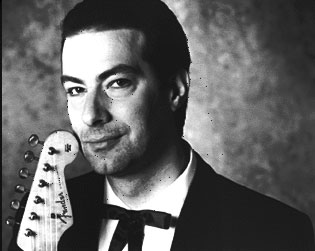 |
And work he did, soon becoming the leader of the number one bar band on the hometown circuit. When you're working 53 weeks a year a decade can pass in no time, and that’s just what happened, until one day bassist, Alec Fraser, pointed out that nobody gets anywhere being a bar band, except maybe more bar gigs, and a chance for a liver transplant. With these sobering words, Danny set his sights on other goals, and as fate would have it, he was about to meet his mentor.
One day, I guess it was in ’87, I got a phone call from a man who said his name was David Malahoff ,and he'd like to talk to me about being a guest on CBC Radio’s Basic Black. Just the sound of that name and I knew something very special was about to happen. One appearance on the show led to more, and soon I had my own radio series, Under the Covers, and Duets, and began hosting specials and guesting on other shows on the network, Radio Noon, Ben Merghui Live, and others. It was David who conceived of the Humline and many of Basic Black’s finest creative moments, he’s a deep thinker.
Around that same time I met David Bailey, then a producer at Rogers Cable TV, we became good friends and together we came up with the idea for "Stormy Monday."
Stormy Monday ran for seven years across Canada, in 2003, the Hum Line entered its seventh season on CBC radio nationally.
"If not for the legal complications we'd still be on cable. It’s time we took the show to real TV. And we will" says Danny.
Danny Marks in the 90s
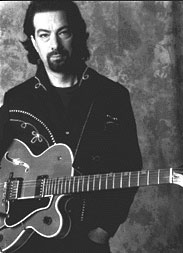 |
With his next album, Danny took aim at the mainstream, he even covered Edward Bear's firs golden oldie, You Me and Mexico. Big Town Boy in 2004 was a tribute to Toronto's golden era followed by True, a vision of the broken hearted songwriter on the rocks. As you can see elsewhere on this site, on reviews and recordings pages, both albums proved the point, generating heartfelt and cool originals on True, while Big Town garnered raves internationally.
|
